You became a consumer protection lawyer to hold abusive corporations accountable, not to lose clients to a broken digital system. But here’s the truth: 75% of users never scroll past the first page of search results. If your practice isn’t showing up where people are looking, your online visibility is compromised, and you’re effectively invisible.
When someone’s being harassed by debt collectors or tricked by hidden fees, they turn to Google, not legal directories or phone books. And if your firm doesn’t appear on that crucial first page, potential clients are either hiring your competitors or giving up altogether.
This guide will walk you through digital marketing strategies tailored specifically for consumer protection attorneys, so you can rise above the noise, reach the people who need you most, and build the practice your mission deserves.

Why Consumer Protection Lawyers Can’t Afford to Ignore Digital Marketing
Picture this: A single mother discovers her credit report is riddled with errors after a data breach. An elderly couple realizes they’ve been overcharged thousands by their mortgage servicer. A recent college grad is drowning in illegal robocalls from debt collectors.
What do they all do first? They search online for answers — and for lawyers who can help.
The Numbers Don’t Lie
- 74% of people seeking legal advice start with a search engine
- 75% of lawyers say their website is the most effective marketing tool.
- 66% of clients contact only the first lawyer they find online

If you’re not ranking when these vulnerable clients need you most, you’re not just losing cases — you’re failing your mission.
Consumer Protection Law Is Different
Unlike personal injury or criminal defense, consumer protection clients often don’t know they need a lawyer. They search for problems, not solutions:
- “Is it legal for debt collectors to call at night?”
- “Can a company change my contract without telling me?”
- “What to do about identity theft”
- “How to stop robocalls permanently”
Your law firm’s online marketing must intercept these searches with helpful, authoritative content that positions you as their advocate, before they even realize they need one.
The Trust Factor
Consumer protection clients have already been burned once. They’re skeptical, scared, and searching for someone they can trust. Your online presence must radiate credibility, expertise, and genuine care for their situation.
That’s where strategic digital marketing for lawyers becomes your most powerful tool for building trust at scale.
1. Craft a Comprehensive Digital Marketing Strategy
Before you launch a single campaign or write one piece of content, you need a roadmap. A strategic approach to digital marketing for lawyers isn’t just about throwing tactics at the wall to see what sticks — it’s about creating a cohesive system that consistently delivers results.
Define Your Target Audience and Goals
Consumer protection law covers a broad spectrum, from debt collection defense to privacy violations to lemon law cases. Your digital marketing strategy must reflect your specific focus areas and the clients you serve best.
Start by asking these critical questions:
- Are you targeting individuals facing debt collection issues?
- Do you focus on class action cases against major corporations?
- Are you the go-to firm for identity theft and privacy violations?
- What geographic area do you serve?
Your answers shape everything from your content themes to your advertising spend allocation.
Set Measurable Objectives
Vague website goals like “get more clients” won’t drive results. Instead, establish specific, measurable targets:
- Increase qualified leads by 40% within six months
- Generate 25 new consultation requests monthly through organic search
- Achieve first-page rankings for 15 target keywords in your practice area
- Build an email list of 1,000 subscribers interested in consumer rights updates
Analyze Your Competition
Your competitors aren’t just other consumer protection lawyers — they’re any firm capturing the attention of your ideal clients. Use tools like SEMrush or Ahrefs to analyze:
- Which keywords your competitors rank for that you don’t
- What content topics generate the most engagement
- How they structure their service pages and calls-to-action
- Their social media presence and engagement strategies
This competitive intelligence reveals gaps you can exploit and successful tactics you can adapt for your firm.
AI Strategy Tip: Use ChatGPT or Claude to analyze competitor websites and identify content gaps. For example: “Analyze this consumer protection law firm’s website and identify 10 topics they haven’t covered that would be valuable to potential clients dealing with debt collection issues.”
2. Design and Launch a High-Converting Professional Website
Your lawyer website is your digital office. And just like you wouldn’t meet clients in a cluttered, outdated space, your online presence must inspire immediate confidence and trust.
For consumer protection lawyers, creating a robust online presence isn’t just about aesthetics — it’s about creating a haven for people who’ve been wronged.
First Impressions That Build Trust
When a scam victim lands on your site at 11 PM, panicked and searching for help, they decide in 3 seconds: Can this lawyer help me, or should I keep looking?
Your homepage must immediately communicate:
- You specialize in consumer protection (not 47 other practice areas)
- You understand their specific problem
- You’ve won similar cases before
- Getting help is easy and risk-free
Skip the generic “Fighting for Justice” headlines.
Instead, try: “Debt Collectors Harassing You? We Make Them Pay — Literally.”
Mobile Experience Is Non-Negotiable
60% of consumer protection searches happen on mobile devices — often during lunch breaks or after kids are in bed. If your site doesn’t load instantly and work flawlessly on smartphones, you’re abandoning clients when they need you most.
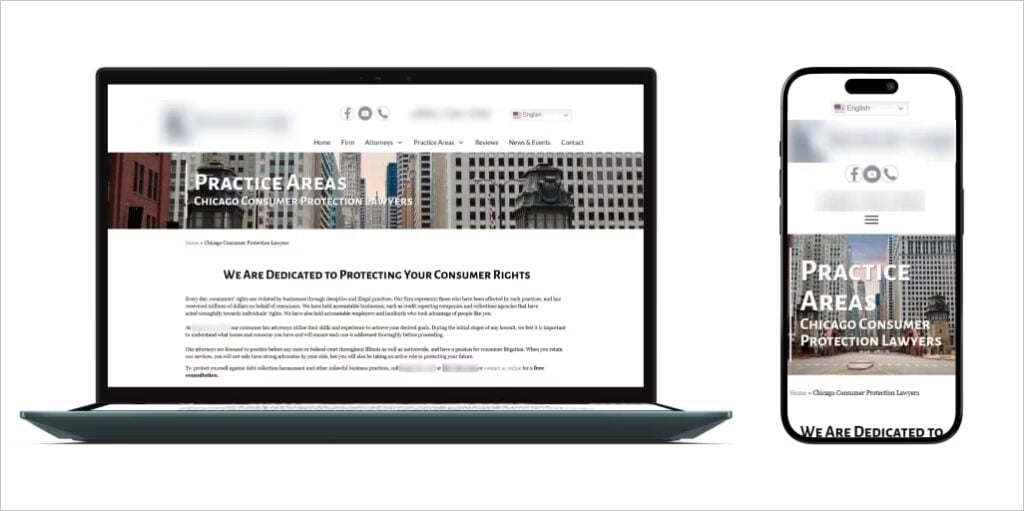
Essential mobile features:
- Tap-to-call buttons that work
- Forms that don’t require zooming
- Fast-loading pages (under 2 seconds)
- Readable text without pinching
Convert Visitors Into Clients
Your website should act as a clear and helpful guide, not a confusing maze—the key to effective law firm conversion rate optimization. When someone’s overwhelmed and looking for answers, your site should gently lead them to take that next step—getting in touch with you. Keep things simple: a phone number and a bold “Free Consultation” button that’s always within reach, no matter where they are on the page.
Add a live chat so they can talk to someone, even if it’s after hours. Make your contact form short and sweet—just the basics. Throughout the site, show them they can trust you: highlight real success stories, client testimonials, and clear proof that you get results. And most importantly, let them know there’s no risk: you only get paid if they win, which attracts high-quality leads.
Demonstrate Your Expertise
Consumer protection clients need to know you’re not just another lawyer — you’re their specialist. Showcase:
- Specific laws you enforce (FDCPA, FCRA, TCPA, etc.)
- Types of violations you handle
- Recent case victories with real numbers
- Your background in consumer advocacy
- Media mentions or speaking engagements
Remember: Scared, frustrated people don’t want to decipher legal jargon. Write like you’re explaining their rights to a friend — clear, caring, and actionable.
3. Implement Strategic Search Engine Optimization (SEO)
Even if you’re the leading consumer protection lawyer in your state, being buried on page 3 of Google makes you invisible to many. SEO for lawyers isn’t about tricks — it’s about making sure victims find the right help without compromise.
Master the Keywords That Matter
Clients seeking consumer protection rarely type “consumer protection lawyer.” Their searches focus on the issues they face. Smart keyword research for lawyers reveals these problem-driven queries:
- “Debt collector calling my family”
- “Credit report errors after identity theft”
- “Can I sue for robocalls?”
- “Mortgage company charging illegal fees”
- “Student loan servicer mistakes”
Your keyword strategy must reflect how real people describe their situations, not how lawyers talk about the law.
Local SEO: Become the Neighborhood Champion
Local SEO for lawyers means more than just showing up in search results; it’s about standing out and capturing attention where it matters most. When someone types in “FCRA lawyer near me” or “consumer rights attorney in [your city],” your firm should be front and center.
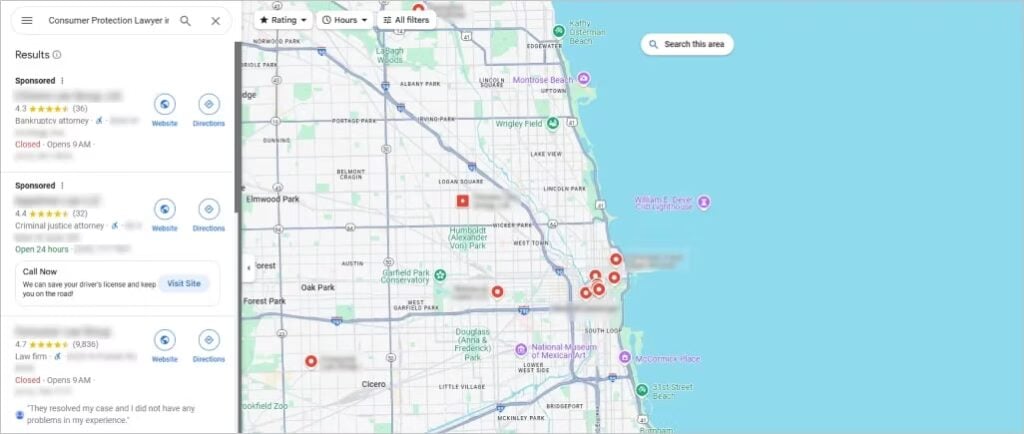
That starts with creating dedicated pages for each office location and making sure your Google Business Profile is filled out with care and detail. Consistency is key across every online directory, and tools like BrightLocal or Moz Local make it easier to find and fix anything that’s off.
Add in a steady stream of genuine reviews from satisfied clients, and don’t forget to naturally work in search terms like “[City] consumer protection lawyer” throughout your site. It’s a combination of strategy and authenticity, and effective lead generation, when done right, brings the right clients straight to your door.
Optimize for Featured Snippets and AI Search
With AI-powered search experiences becoming more prevalent, your content needs to be structured for direct answers. Many consumer protection queries trigger featured snippets — those answer boxes that appear at the top of search results.
Optimize for snippets by:
- Creating FAQ sections that directly answer common questions
- Using clear headings and structured data markup
- Providing concise, authoritative answers to specific legal questions
- Including step-by-step processes for common consumer protection issues
Build Authority Through Technical SEO
If you want search engines to trust your site and boost it to the top of the rankings, you’ve got to start with solid technical SEO. It’s the foundation everything else rests on. That means making sure your pages load quickly, no matter what device someone’s using, organizing your site in a way that’s easy for search engines to navigate, and using headers to structure your content.
On top of that, having proper sitemaps, robots.txt files, and adding schema markup—especially for legal services and local businesses—helps search engines understand exactly what your site is about. Without these technical essentials, even the best content can get lost in the shuffle. Think of technical SEO as the backstage crew that makes your whole show run smoothly and get noticed.
Technical SEO Tip: Run regular audits with Screaming Frog to identify broken links, duplicate content, and crawl errors that can hurt your site’s SEO health and user experience.
The goal isn’t to rank for every keyword — it’s to be findable when someone desperately needs a consumer protection advocate.
4. Develop Engaging and Valuable Content Across Channels
Content marketing for consumer protection lawyers isn’t about blogging for blogging’s sake. It’s about becoming the trusted resource that empowers victims to fight back.
When done right, your content doesn’t just attract clients — it starts evening the playing field before they even call you.
Create Content That Educates and Empowers
When people face debt collectors or tricky mortgage servicers, they need more than facts—they need hope. Your legal blogging must connect with their feelings of overwhelm and anxiety, offering clear guidance that brings comfort and direction.
Offer real help with titles like “10 Magic Words That Stop Debt Collectors Cold” or “How to Document Robocall Harassment (Free Template Included).” Make it easy to understand. Ditch the legalese. If your grandma wouldn’t get it, it needs to be simpler. Speak with empathy, write with purpose, and give people the tools they need to take back control.
Build Resource Centers That Attract and Convert
Go beyond blog posts. Create comprehensive resource hubs:
- Violation Checkers: Interactive tools that help visitors identify if their rights were violated
- Letter Templates: Cease and desist letters can be customized
- FAQ Libraries: Organized by violation type
- Video Guides: Show them how to gather evidence
- Case Result Galleries: Prove you get results
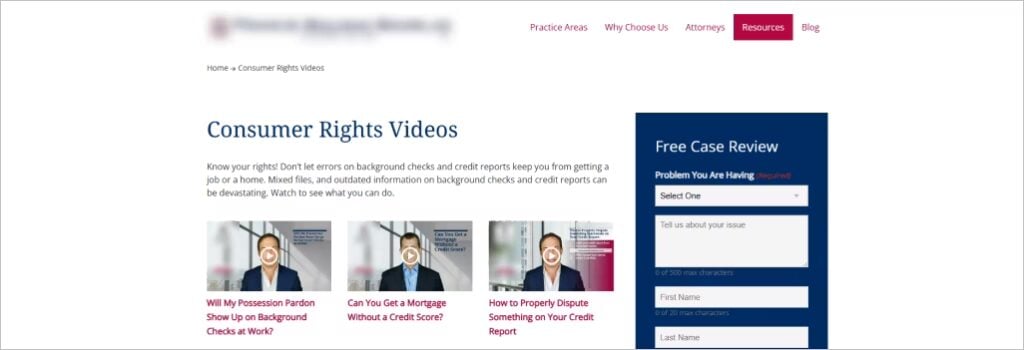
These resources position you as the expert while giving visitors genuine value — even if they’re not ready to hire you yet.
Leverage Multiple Content Formats
Different people consume information differently:
- Videos: “What to Do When a Debt Collector Calls” (2-3 minutes)
- Infographics: “Your Rights Under the FDCPA” visual guide
- Podcasts: Interview clients about their victories
- Downloadable Guides: “Consumer Protection Survival Kit”
- Email Courses: “7 Days to Stop Collector Harassment”
Content Distribution Strategy
Creating helpful content is just the beginning—what really matters is getting it in front of the people who need it most. Start by sharing it in Facebook groups where victims are actively looking for support, or join conversations on Reddit threads like r/personalfinance and r/legaladvice.
Partner with trusted credit counseling organizations to extend your reach, and write guest posts for consumer advocacy websites to build credibility. Then, make the most of your efforts by repurposing that content across all your channels, so it keeps working long after you hit publish.
Measure What Matters
It’s easy to get caught up in likes and clicks, but what matters is whether your content is making a genuine impact. Are people spending time reading it? Are they finding value in your resources and taking the next step, like downloading a guide or filling out a contact form? Notice which topics spark the most interest and lead to real conversations. And don’t underestimate the power of client feedback—it’s one of the clearest signs you’re doing something right.
Remember: Every piece of content should either help someone solve their problem or convince them you’re the lawyer to call. Preferably both.
5. Run Targeted Pay-Per-Click (PPC) Ad Campaigns
While SEO builds your long-term foundation, law firm PPC puts you in front of desperate clients right now. For consumer protection lawyers, paid ads can be the difference between a victim finding help tonight or suffering in silence.

Target High-Intent, Crisis Keywords
When people search for consumer protection help, they’re often in a panic, facing real, urgent problems. They’re not just browsing; they need solutions now. That’s why your PPC campaigns should focus on crisis keywords like “stop wage garnishment attorney” or “emergency FDCPA lawyer.” These searches come from folks ready to take action immediately. By reaching them right at that critical moment, you’re not just getting clicks—you’re connecting with people who truly need your help.
Craft Ad Copy That Resonates
Your ads have milliseconds to connect. Skip the legal jargon and speak directly to their pain:
- Weak Ad: “Experienced Consumer Protection Attorney – Call Today”
- Strong Ad: “Debt Collectors Harassing You? We Make Them Pay You Instead. Free Consultation”
Include emotional triggers and clear benefits:
- “Stop the Calls Today”
- “You May Be Owed $1,000+”
- “No Fee Unless We Win”
- “Same Day Response”
Optimize Landing Pages for Conversion
Don’t just send your PPC traffic to your homepage and hope for the best. Instead, create landing pages that align with Google ranking factors for lawyers and speak directly to what your ads promise. Make them simple and distraction-free, with a clear contact form right upfront.
Show your visitors why they can trust you from the moment they arrive. And make sure these pages load fast—under two seconds—and look great on any device, especially mobile. That’s how you turn clicks into customers.
Strategic Campaign Structure
Organize campaigns by violation type and intent:
- FDCPA Violations: Target debt collection harassment searches
- FCRA Violations: Focus on credit report error keywords
- TCPA Violations: Capture robocall and text spam searches
- Identity Theft: Help data breach victims
- Predatory Lending: Target payday loan and mortgage fraud terms
Advanced PPC Tactics
Take your campaigns beyond basics:
- Call-Only Campaigns: Perfect for mobile crisis searches
- Remarketing: Stay visible to site visitors who didn’t convert
- YouTube Ads: Target consumer protection-related videos
- Gmail Ads: Appear when people search relevant terms in email
- Competitor Campaigns: Bid on other consumer protection law firms
Budget Smart, Not Hard
Consumer protection PPC can get expensive quickly, but with a smarter approach, you can keep your budget tight and your results powerful. Start by cutting out wasted clicks—filter out terms like “free,” “pro bono,” or “sample letter” so you only attract serious clients. Then, get laser-focused on the right locations and run your ads during the hours when people are ready to take action.
Put your money behind the ads and keywords that have already proven they convert, and don’t be afraid to test constantly—cut the underperformers fast before they drain your budget. At the end of the day, it’s not about the number of clicks, it’s about the quality of leads that turn into real cases. Spending $50 on a click that turns into a $10,000 case? That’s not just smart spending—that’s winning.
6. Expand Your Reach Through Strategic Social Media Marketing
Social media marketing for lawyers isn’t about jumping on every viral trend. It’s about showing up consistently, being easy to find, and offering real support to those who need hope and someone they can truly trust to fight for their rights.
Choose Platforms Where Victims Seek Support
Not all social media is created equal for consumer protection lawyers:
- Facebook: Where your clients share horror stories about debt collectors and ask for recommendations
- LinkedIn: For networking with other attorneys and establishing professional credibility
- YouTube: Perfect for explaining complex consumer rights in simple terms
- Twitter/X: Great for commenting on breaking consumer protection news
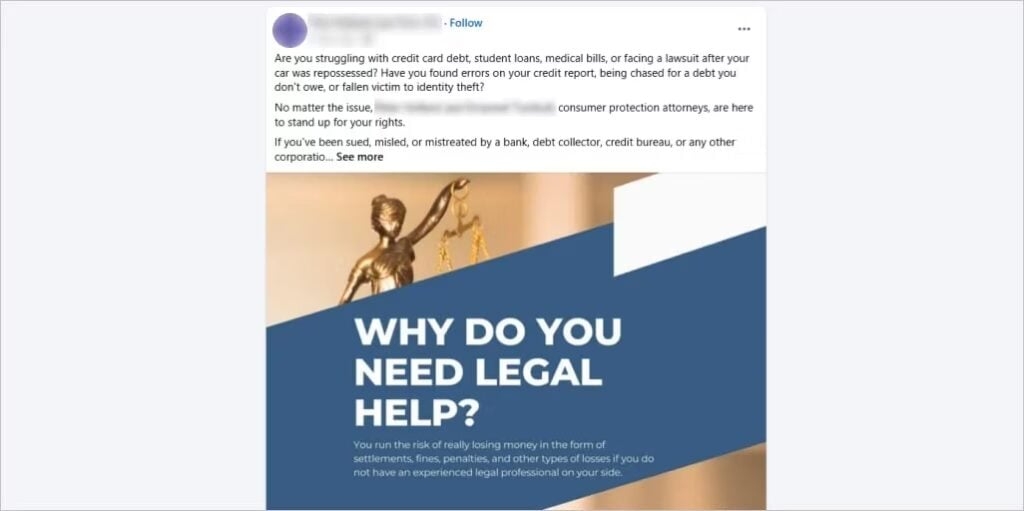
Skip TikTok and Instagram unless you have a specific strategy. Your time is better spent where your clients actually are.
Content That Builds Trust and Authority
Legal copywriting for social media needs to prioritize education over direct advertising:
- Monday Motivation: Client success story (anonymized)
- Warning Wednesday: Common scams to avoid
- Fact Friday: Bust myths about consumer rights
- Victory Posts: “$X,XXX settlement for illegal robocalls”
- Educational Series: “Types of FDCPA Violations” carousel posts
Engage Authentically
Don’t just show up—get involved. Join real conversations, offer support to people dealing with debt, and share content that helps others, not just your brand. When someone sends a message, be the one who replies fast and with heart. And when people share your work or leave kind words, don’t forget to say thank you. Being human beats being polished—every time.
Build Community, Not Just Followers
It’s easy to chase followers. But what truly matters is creating a space where people feel safe, supported, and connected. Give your clients more than content—give them each other. Start a private Facebook group where they can talk freely, share their experiences, and lift each other up.
Host honest, open Q&A sessions where no question is too small. Share the tools that have helped others, and celebrate every win—because when one person rises, the whole community does too. This isn’t just about support. It’s about belonging.
Measure Impact, Not Vanity Metrics
Stop getting caught up in likes and follower counts—they don’t tell the whole story. What really counts is the difference you make in people’s lives. It’s those genuine messages from folks reaching out for help, the clicks that lead someone to connect with you, the shares that spread valuable knowledge, and the followers who care and engage.
But above all, it’s the real conversations that turn into consultations—those moments where you make a real impact. Because saving even one person from financial struggle means more than thousands of followers who don’t truly need you. That’s the kind of success worth chasing.
7. Monitor and Manage Your Online Reputation Proactively
Reputation management for lawyers is about something deeper than just getting noticed — it’s about earning trust one interaction at a time. Clients who put their financial futures in your hands watch every review and online mention carefully. That’s why managing your reputation isn’t just smart for client relationships, it’s necessary for standing out as a credible expert.
Build a Review Generation System
Instead of hoping clients post reviews on attorney review sites, create an easy, well-designed process that motivates them to share their feedback. Timing is everything: the best moment to ask is right after you’ve won a case or when a client genuinely thanks you. Avoid asking during stressful moments—no one wants to be put on the spot then.
Make the process effortless. Send direct links to your review pages with clear, friendly instructions. If some clients aren’t comfortable with technology, offer a helping hand—it shows you care. And if they forget, a gentle, polite reminder can make all the difference without feeling pushy.
Focus on the platforms that matter. Google Business Profile is a must for boosting your visibility. Avvo helps build your legal reputation, Facebook adds that personal touch of social proof, and the Better Business Bureau reinforces trust. If Yelp is popular where you practice, include that too.
By being thoughtful and approachable, you’ll naturally turn satisfied clients into enthusiastic reviewers—and build a reputation that speaks for itself.
Respond to Reviews Like a Professional
Every review is an opportunity to show your character:
- Positive Reviews: “Thank you for trusting us with your case. It’s victories like yours that remind us why we fight for consumer rights every day.”
- Negative Reviews: “We appreciate your feedback and take your concerns seriously. Please contact our office directly so we can address this matter properly.”
Never argue online. Take difficult conversations offline.
Monitor Your Digital Footprint
Stay on top of your digital footprint by setting up alerts for your name, your firm, and important team members. Be sure to include your practice areas and city, so you never miss a relevant mention.
It’s also smart to watch for common misspellings and keep an eye on what competitors are doing — it’s like having your finger on the pulse of your industry.
Tools like Google Alerts, Mention, or Brand24 make it easy to keep track of everything without lifting a finger. That way, you’re always in the loop and ready to respond.
Leverage Testimonials Strategically
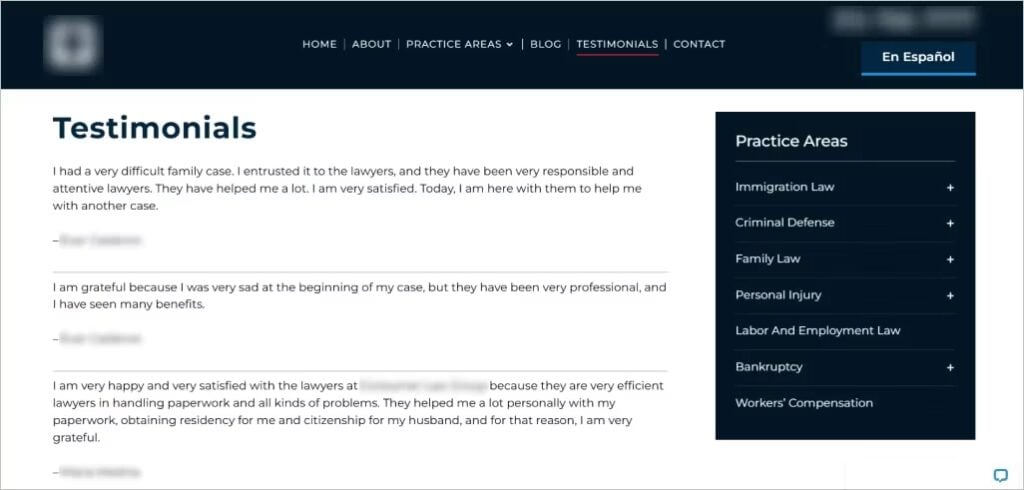
Your best reviews aren’t just words — they’re powerful stories that show the real impact you make. Put them front and center on your homepage where visitors can see them right away. Bring those stories to life with authentic, heartfelt video testimonials that create a genuine connection.
Share success stories that highlight how you’ve helped people, always with their permission, of course. Take it a step further by turning these experiences into in-depth case studies that show what you’re all about. And make sure to sprinkle these honest voices throughout your marketing, because nothing builds trust and excitement quite like hearing from real people who’ve been there.
Address Issues Before They Escalate
If you notice patterns in feedback:
- Slow response times? Improve your intake process
- Communication complaints? Set better expectations
- Fee concerns? Clarify your contingency structure
Your online reputation is your most valuable asset. Protect it fiercely, build it deliberately, and let it work for you 24/7.
8. Nurture Leads and Boost Retention with Email Marketing
Email marketing for consumer protection lawyers isn’t about spamming people with newsletters they’ll never read. It’s about implementing a strong email marketing strategy to stay connected with vulnerable clients throughout their journey, and being there when they need you again.
Build Your List the Right Way
Every visitor to your site is a potential client or referral source. Capture their information ethically:
Valuable Lead Magnets:
- “Debt Collector Scripts: What to Say When They Call”
- “Credit Report Error Dispute Letter Templates”
- “Know Your Rights Checklist for Consumers”
- “10 Signs You’re a Victim of Predatory Lending”
- “Robocall Log Template for Building Your Case”
Exchange real value for their email address. Generic newsletters don’t cut it.
Segment for Success
Not all subscribers need the same information:
- Current Clients: Case updates, document reminders, court dates
- Past Clients: Referral requests, related services, success stories
- Potential Clients: Educational content, trust building, soft calls-to-action
- Referral Partners: Industry updates, collaboration opportunities
- Different Violation Types: FDCPA vs. FCRA vs. TCPA content
Email Campaigns That Convert
Want your email campaigns to connect and get results? Start with a warm welcome that delivers real value right away. Share the resource they asked for, then tell them who you are and why you care. Help them spot common mistakes most people miss, share inspiring success stories from clients, and finish with a simple, friendly invite to a free consultation—no pressure, just genuine support.
Then, keep the conversation going with bite-sized educational series that help, like understanding your consumer rights in a week, navigating debt collection harassment, mastering your credit report, and protecting yourself from identity theft. These emails don’t just inform; they empower your audience to take control and feel confident every step of the way.
Write Emails People Actually Read
Let’s be real — your clients get flooded with emails every day. If you want yours to stand out, make it something they want to read. Start with a subject line that grabs attention and sparks curiosity, like “They Called Your Mom? That’s Illegal.”
Keep your message easy to digest by using short, punchy paragraphs and focusing on just one main point. Write like you’re chatting with a friend—friendly, personal, and genuine. And don’t forget to always include a simple, useful tip they can put to work right away. That’s how you turn an ordinary email into a highlight of their inbox.
Automate Without Losing Authenticity
Set up triggers based on behavior:
- Download guide → Follow up with related content
- Visit the practice area page 3x → Send relevant case studies
- Open 5+ emails → Invite to schedule consultation
- 6 months post-case → Request review/referral
- Birthday → Personal greeting with consumer tip
Measure and Optimize
If you want your emails to truly hit the mark, focus on the numbers that really tell the story. Aim for open rates above 25%—that means people are actually curious about what you’re sharing. Then, watch for at least 5% of those opens turning into clicks, because that’s where real interest shows up.
Pay attention to how many people reach out for consultations—that’s your best sign that your message is resonating. Keep your unsubscribe rate low, under 1%, so you don’t lose your audience. And don’t forget to track the revenue your campaigns bring in—that’s how you see the real payoff.
When you keep these key metrics in check, you’re not just sending emails—you’re sparking connections that help your business grow.
Compliance Is Critical
Remember CAN-SPAM requirements:
- Clear unsubscribe option
- Accurate subject lines
- Physical mailing address
- Honor opt-outs immediately
- No deceptive content
Your email list is a trust-based relationship. Nurture it with valuable content, and it becomes your most reliable source of new cases and referrals.
Conclusion: Your Digital Marketing Action Plan
Every moment you wait is a missed opportunity — not just for your practice, but for the people who desperately need your help. Predatory lenders, debt collectors, and deceptive businesses aren’t slowing down. But with the right digital strategy, neither will you.
At Comrade Digital Marketing, we specialize in helping consumer protection lawyers grow their firms, expand their reach, and connect with the people who need them most. Our data-driven strategies are designed not just to attract clicks, but to drive real cases from real clients — the ones who need your advocacy and expertise.
You don’t have to navigate digital marketing alone. Whether you’re ready to revamp your website, dominate search results, or launch a full-scale online campaign, our team is here to support you every step of the way. Let’s build your visibility — and your impact!
Contact us today and start turning your online presence into a powerful tool for justice.
Frequently Asked Questions
-
Is it possible to do digital marketing on a small budget?
Yes, small budgets can still support law firm digital marketing campaigns if approached strategically. Legal professionals can focus on targeted efforts that maximize reach without overspending. By prioritizing cost-effective channels, even limited resources can attract prospective clients efficiently.
-
Can I scale my budget as I see results?
Scaling marketing efforts based on initial outcomes is a smart approach. Effective digital marketing strategies allow legal professionals to adjust spending according to what drives engagement. Gradually increasing investment helps optimize return and expand reach with confidence.
-
What are the most common mistakes consumer protection lawyers make in digital marketing?
Many overlook the importance of applying top digital marketing strategies tailored for their niche. Legal professionals sometimes neglect consistent follow-up with prospective clients, limiting conversion rates. Additionally, failing to track campaign performance can waste resources and hinder growth.
